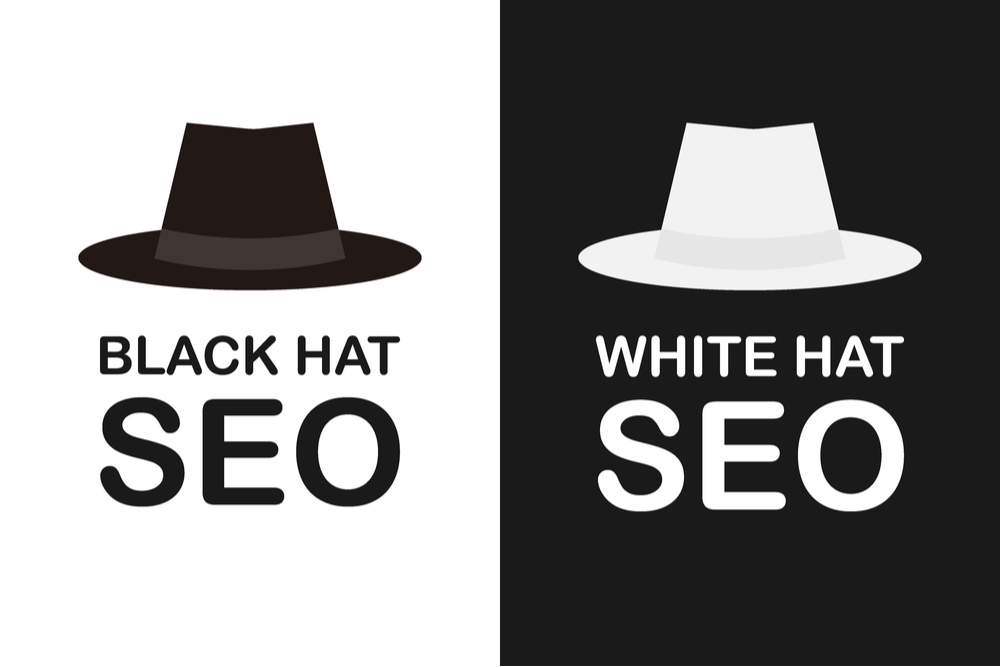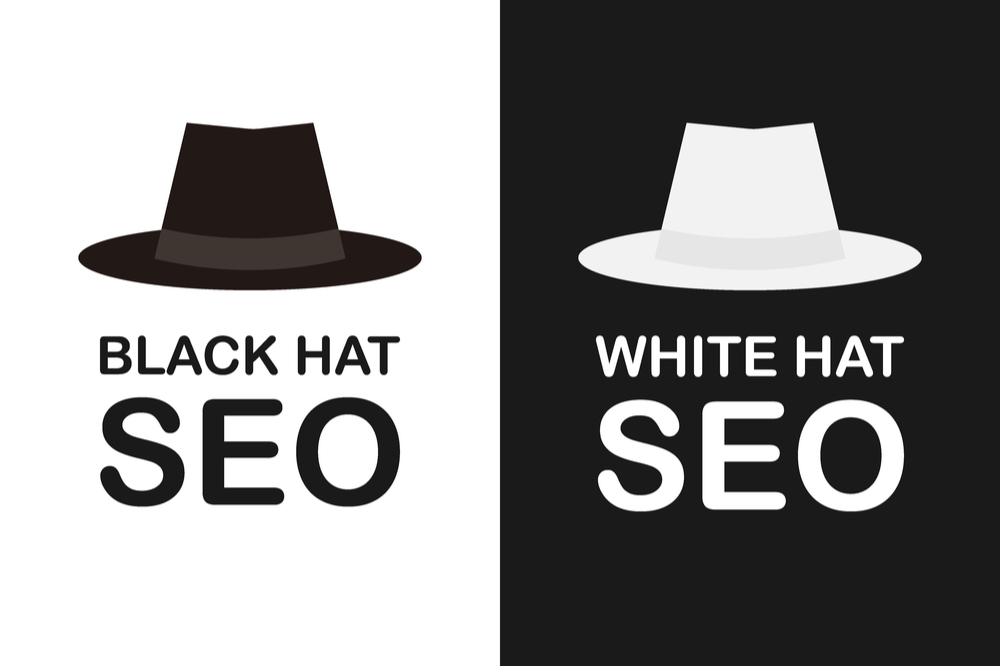
The terms ‘White Hat’ and ‘Black Hat’ derive from old movies about the Wild West that depicted heroes wearing white hats and villains wearing black hats. Modern SEO experts use ‘White Hat SEO’ and ‘Black Hat SEO’ to explain the difference between good and bad search optimization practices, both of which are used to increase your online presence.
The Difference Between Black Hat SEO and White Hat SEO
Understanding the difference between Black Hat SEO and White Hat SEO can help your website thrive. Black Hat SEO practices, while sometimes effective, can lead to your website being penalized by Google, Bing, and other search engines. These penalties can damage your website’s Search Engine Results Page (SERP) rankings or even result in a ban from search engines altogether.
White Hat SEO, on the other hand, follows the required guidelines and legal standards set forth by search engines, while also helping you establish a solid brand foundation. White Hat SEO involves all the good stuff: writing high-quality content, making your site mobile friendly, and optimizing site speed.
What Does Black Hat SEO Look Like?
Black Hat SEO makes use of specific, unethical SEO activities to raise a website’s rank on Google and other search engine results pages. Black Hat SEO essentially games the systems put in place by Google to outrank competitor websites. While these methods and activities may be effective in the short term for quick returns, they often ultimately produce adverse effects and result in a long-term drop in the rankings.
Black Hat SEO focuses almost exclusively on search engines and rarely involves gaming the human audience. Techniques used in Black Hat SEO include hidden text and links, keyword stuffing, link schemes, blog content spamming, and more.
Below are the top three Black Hat SEO techniques used to increase traffic.
Keyword Stuffing
Keyword stuffing is the unnatural and repetitive use of the main target keywords throughout web page content. Black Hat SEO uses this technique to manipulate the website’s rankings on the SERPs. When read aloud, sentences that have been stuffed with keywords generally make little sense. This SEO tactic will often receive a red flag from more modern search engine algorithms, resulting in penalties to your website.
Link Schemes
Link schemes or manipulative links remain some of the most popular Black Hat SEO techniques. Black Hat SEO takes advantage of the fact that incorporating links into a website’s content can boost its rankings, especially if the links are to reputable sites. Black Hat SEO practitioners sometimes bury links in different parts of the website, including blog comments, unscrupulously stuffing these links into the site regardless of their value to the reader.
Hidden Text
Hidden Text refers to words that have a color that matches the background of a webpage, rendering them invisible to the viewer. Black Hat SEO uses this technique to enter additional keywords onto the webpage, which helps search engines identify it faster, while remaining invisible to the reader. Black Hat SEO also makes use of texts with size zero fonts to deceive search engines.
Why Should You Avoid Black Hat SEO?
Although Black Hat SEO provides a quick way to boost your website’s rankings, it can ultimately hurt your site’s rankings and credibility down the road. It represents an unethical practice and can prove detrimental to your website and your brand in several ways.
Violation of Terms of Service
Black Hat SEO violates search engines’ terms of service and can result in your website losing its rankings or disappearing from SERPs altogether. Search engines that detect Black Hat SEO practices on websites may penalize or even ban these sites from appearing in their search results.
Closed Loopholes
Black Hat SEO exploits loopholes in search guidelines to provide short-term results. If your website takes advantage of these loopholes, it likely won’t last long. Expect a drop in ranking once the bugs are fixed and the loopholes are closed.
Poor User Experience
Black Hat SEO combined with low-quality content creates a poor user experience, which reduces your website or brand’s popularity and credibility, and translates into higher bounce rates. It creates a misleading environment that can cause users to leave your page and look for other alternatives.
What Does White Hat SEO Look Like?
White Hat SEO refers to any practice aiming to improve your website’s rankings when searching on a SERP while still abiding by the search engines’ terms of use. White Hat SEO focuses on reinforcing your viewer engagement for greater site traffic and making your website easily crawlable by search engines. This is done through the creation of well-written, cleanly-formatted content, use of relevant keywords and mobile-friendly web pages, among other factors. Instead of sneaking in irrelevant keywords, links, and pictures to rank higher on SERPs, White Hat SEO focuses on content that answers user queries.
White Hat Techniques to Ensure Your Site Practices Ethical SEO
Search engine algorithms react to countless signals when ranking website pages in their search results. Understanding these factors allows you to better optimize your website and achieve better rankings on the SERPs. Here are a few White Hat SEO techniques to follow.
Focus on User Experience
Search engine algorithms encourage webmasters and SEO experts to shift their focus from satisfying the search engine to providing users with a fulfilling experience. Websites that follow search engine guidelines tend to feature higher in the rankings, especially as the algorithms become smarter. Improving the user experience also entails building a mobile-friendly site and keeping all content professional, organized and informative.
Keyword Research
Keyword research represents a crucial aspect of ethical SEO. Because all search engines have reduced keyword data over the years, advanced SEO tools have been developed to improve keyword data analysis. These tools allow search engines to understand language nuances like synonyms, stemming and root words.
Link Building
Earning backlinks from other relevant, reputable websites can result in increased traffic for your website. Setting up a resource page, FAQ page or simply writing and sharing blogs on a regular basis are all effective approaches to earning legitimate links and building trust and authority.
Conclusion
Your website’s use of Black Hat SEO or White Hat SEO practices can mean the difference between your website receiving a ban and achieving better rankings. Take time to reflect on the techniques you use to improve your website’s SEO. An ethical approach remains the best way to ensure your website enjoys a long and healthy reign atop the Internet.
If you have questions about your SEO practices or would like to learn what else you can be doing to better leverage your marketing dollars, get in touch with our team today!




.png?width=1625&name=logo%20(1).png)